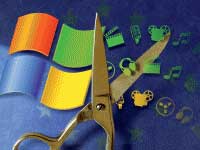 According to Microsoft, since March 2004, only 1,787 copies of XPN (Windows without Media Player) have been distributed to retailers, but they cannot determine how many people have actually purchased it.
According to Microsoft, since March 2004, only 1,787 copies of XPN (Windows without Media Player) have been distributed to retailers, but they cannot determine how many people have actually purchased it.
During the opening session of the appeal against the European Commission’s ruling (held on April 24 in Luxembourg), attorney Jean-Francois Bellis suggested that some individuals may have bought Windows XPN as a memento of the antitrust lawsuit from two years ago.
Bellis noted that two computer manufacturers, HP and Toshiba, showed interest in an operating system that does not integrate Media Player, but ultimately, no one was willing to release PCs with such a product.
The European Commission believes that Microsoft’s integration of Media Player into Windows restricts customers’ choices when it comes to other audio-visual software. Over time, providers will only release content in formats compatible with Media Player.
However, Microsoft asserts that this is not the case. Users can still freely install various programs with different features on their systems. Two new competitors, Google Video and Flash, also demonstrate that this market is quite “open.” The American software giant pointed out that Apple has sold up to 50 million iPods without the need for Windows Media Player. Additionally, removing the code in XPN would not only terminate Media Player but also hinder the functionality of many other applications like Napster.
The appeals court will convene for five days. The first two days will primarily focus on the issue of Media Player in Windows, while the following two days will address Microsoft’s need to expand information related to the operating system for competing manufacturers. The court sessions will conclude on April 28, but the final ruling will not be delivered until the end of the year.
T.N.


















































